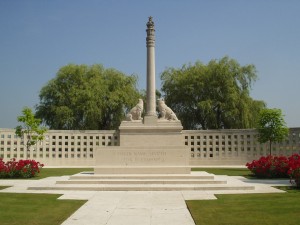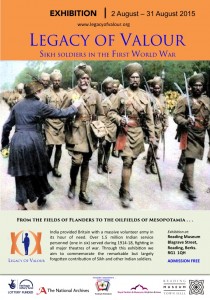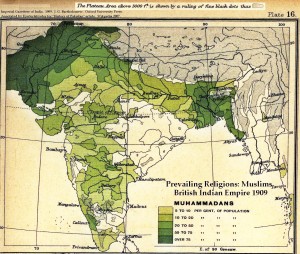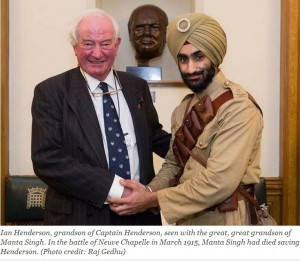An exhibition organised by the Wokingham and Reading Sikh community will recount India’s support for the British Empire during World War One. India provided Britain with a massive volunteer army in its hour of need with over 1.5million Indian soldiers and support personnel serving during 1914 to 1918. Their contribution to the early part of the war was especially critical; Britain had seen most of its professional army wiped out by the summer of 1915 and Kitchener’s army were not ready to fight until the September of that year. To tell their story, the exhibition hosts many rare documents and photographs unseen in public for over a century and can be seen now at the Reading Museum on Blagrave Street until Monday 31st August 2015.
The geographical and political changes which took place on the sub-continent in the following one hundred years means that the India of today is not the country it was when it entered the war. Following WW2 the India divided along largely religious lines forming Pakistan and Bangladesh (Muslim communities) and India (Sikh and Hindu). Therefore, from a historical perspective it is important to note India’s warriors came from across its religious spectrum.
Another significant point made by the researchers was that over 1.5 million Indian soldiers served across the warring territories; more than the Australians, Kiwis, Canadians and South Africans put together. Although this is not a competition of numbers, the question arises as to why their story has never attained the same recognition as those other members of the Empire.

The Indian Memorial at Neuve Chapelle commemorates over 4,700 Indian soldiers and labourers who lost their lives on the Western Front during the First World War and have no known graves.
If there is a year which defines the Indian Army’s greatest moment, then 1915 would be a favourite. In Europe, India’s soldiers fought at Ypres at La Bassee, Neuve Chapelle, Auber’s Ridge, Festubert, Loos and again Ypres. Their contribution at this point of the war was critical; Britain had seen most of its professional army wiped out by the summer of 1915 and Kitchener’s volunteer forces were not ready to fight until the September of that year. They were also to serve at Gallipoli in 1915, Givenchy and Somme in 1916, Passchendaele and Mesopotamia in 1917. Wherever the war was fought, the Indian army was omnipresent.
How did the Indian Army view the Western Front?
The Western Front experience for many members of the Indian Army was totally alien to their existing way of life; cold and wet was the start, but every other sense was also invaded. What they saw, could smell, what they heard and touched would have been totally alien to them. However, amongst all the horrors and obvious carnage they came across, the soldiers enjoyed other more positive experiences. Here are some extracts from the soldiers’ letters to home (thanks to the Sikh Foundation for the following fascinating account):
Bakhshis Singh (Sikh) of Sialkot Cavalry Brigade writes (in Gurmukhi) from France on 27th February 1916 to Sher Singh (Ferozepur District, Punjab)
“Here is very cold at present. It snows much. The little discomfort that we experience is due to cold and rain. Otherwise the country is like heaven. It rains frequently. You are, no doubt, astonished at what I say and wonder how this country can be heaven. Listen to one little thing. Here no one drinks water. When they desire to drink, either at meals or any other time, they drink the juice of apples. So many apples are produced that the people press the juice and store it in barrels, (from) which they drink throughout the year. They let us have a bottle full for two pica (paisa). All the men drink it. There is no prohibition – you may bring as much as you like inside the house. Barrels upon barrels are full of it. Moreover there are barns full of apples. If I return alive I will tell you all about this country. You shall be staggered at all I shall tell you. It is real heaven. There is plenty of milk, but only cow’s milk. The people, however, drink very little milk. They milk the cows and then they extract the butter at the rate of a mound (40 kilo) of milk in ten minutes. The skimmed milk they give to cows, calves and pigs. The people are very honest. There is no sign of theft. Goods to the value of lakhs (hundred thousands) of rupees lie in glass houses. No one pays any regard to them. Grain, potatoes and such like things lie in the fields unguarded. In short, the cat plays with pigeons and chicken and the dog plays with the cat and tends the sheep, churns the butter and draws a cart and guards it too. When a cow calves, they immediately take away the calf and do not let the cow see it. They rear it on skimmed milk. They milk the cow daily – two or three times daily – without the calf being present. The cows in fact do not know whether they gave birth to a calf or not. It is the golden age!!
Kartar Singh (Sikh, 15th Sikhs) to Gurdit Singh (Raswind, Punjab) from Milford –on –Sea on 24th February 1916 (Gurmukhi)
“You say that you have heard that the entire Indian Army has left France. This is not so. The infantry have left but the cavalry is still upholding the honour of the Government here. By the Grace of God the cavalry are flourishing like fields of Sarson (rape seed) in the Spring. At the present time much rain and snow are falling and consequently the cold is very severe. The snow accumulates all day….. Sirdar Buta Singh of Rawalpindi has sent a copy of the Granth Sahib. He has conferred a great favour on us, since we can have worship during our sojourn in a foreign land.
Sowar Natha Singh (SIKH) to Sapuran Singh (Lyallpur District, Punjab wrote in Urdu from FPO 19, France on 4th January 1916.
“The country is exceedingly pleasant. In it India is forgotten. I do not wish the war to end soon. I should like to die in this country and I have no intention of returning to India. If you want anything, write to me. May the Holy Guru save me from India? I hope you will answer this quickly, telling me you are well. I am in great comfort as I am always away from the squadron. Tell Basant Kaur from me to look carefully after the children and have them well schooled, fed and clothed. There is no need to think of the cost. She can spend as much as she likes on them. But I have no hope of seeing them again – nor do I wish to see them. For I have found a good opportunity of sacrificing my life and I hope to pay my debt with loyalty.
*Isher Singh (Sikh, 59th Rifles) to a friend (50th Punjabi, Punjab) wrote in Gurmukhi on 1st May 1915 from Indian General Hospital, Brighton describing the war of New Chappell.
“The battle is being carried on very bitterly. In the Lahore Division only 300 men are left. Some are dead, some wounded. The division is finished. Think of it – in taking 50 yards of German trench, 50,000 men are killed. When we attack they direct a terrific fire on us – thousands of men die daily. It looks as if not a single man can remain alive on either side – then (when none is left) there will be peace.
When the German attack they are killed in the same way. For us men it is a bad state of affairs here. Only those return from the battlefield that is slightly wounded. No one else is carried off. Even Sahib (English officers) is not lifted away. The battleground resounds with cries……. Here thing are in a very bad way. In France the news is that dog churn milk in machines and look after the cattle. A man who keeps a dog has to pay five rupees a month to the King.
Do not be anxious about me. We are very well looked after. White soldiers are always besides our bed – day and night. We get very good food four times a day. We also get milk. Our hospital is in the place where the king used to have his throne (Brighton Pavilion). Every man is washed once in hot water. The King has given strict order that no trouble be given to any black man in hospital. Men in hospital are tended like flowers and the King and Queen sometimes comes to visit them.’’
For more information on the Sikh community:
http://www.sikhfoundation.org/people-events/world-war-i-through-sikh-soldiers-letters/



